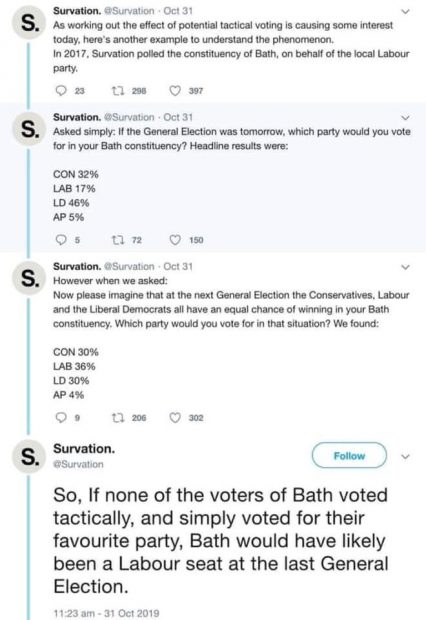One feature of the UK election has been various electoral alliances or deals done. This has mostly occurred around the issue of Brexit.
Early on in the campaign I wrote about Trump’s intervention in the UK election, specifically him calling on The Brexit Party and The Conservatives to do a deal. My view at the time was that the Brexit Party would be better off not doing such a deal, as it would tie their fortunes too closely to the Conservative Government. However, the pressure to not split the leave vote eventually meant The Brexit party did a deal whereby they wouldn’t run candidates in constituencies the Conservatives currently hold. The assumption has been that Brexit Party voters will flock to the Conservatives where there is no Brexit Party Candidate.
On the Remain side there has been this somewhat odd pact between the Liberal Democrats, The Greens and Plaid Cymru. The main benefactor of such an alliance is predicted to be The Liberal Democrats. The Lib Dems have been a close second to the Conservative Party as running the most dishonest campaign in this election, as I outlined in an earlier post. If the Liberal Democrats are coming second in the dishonesty race, it’s the only race they are even close to being second in. Their withdraw article 50 and stop Brexit in its tracks position has not gone down well, so now the party has been forced to flip flop back to calling for a second referendum.
Within the Green Party there has been considerable dismay at the Party leadership decision to form a pact with the Lib Dems. In Bristol the local candidate defied this decision and made the call to stand aside and support the Labour candidate. Many Green Party supporters have expressed the view that their leadership is out of touch. Further that the Lib Dems environmental policies are poor, and not a party the Greens should have formed a pact with. This blog post by London Green Left Blog sums up some of the concerns.
Under First Past the Post, a system that leaves much to be desired minor parties struggle. Vote splitting can be a real problem, and a party can win government despite only receiving over a third of the vote. In this context we can see why there is pressure on the Brexit Party not to take votes off the Tories, or for the Lib Dems to try and soak up the votes of other pro EU parties. The question is, how to voters feel about this? As we’ve seen, plenty of Green Party supporter did not appreciate being told to vote for the Lib Dems, and have decided themselves in many cases to vote Labour or do something else. The assumption that everyone who voted the Brexit Party in the 2019 EU elections would switch to Tory if told so by the party is also a huge assumption. Some will of course, but others will go elsewhere.
An interesting example of how tactical voting can play out in illustrated in the below poll result from Salvation polling done in Bath before the 2017 election:

Whether their statement below is true or not is speculation. However it is interesting when the same group of voters are asked their intentions, one with the assumption that race was between Conservative and Lib Dems, the other when its a 3 horse race.
So what should we take from this. Voters can be influenced by polling and at times do chose to vote tactically, even when polling has proven to be very unreliable in UK elections. Forming electoral pacts is risky, as potentially you are asking voters to support a party because of a position on one issue (Brexit) when actually they find their other policies unpalatable. To assume voters will uniformly fall in line and vote for a party other than they one they really support for tactical reasons would be naive.
[Why are you using this handle and e-mail address when we had agreed that you would stick to one and one only?]
[Edit: comment ‘restored’ on the understanding that this commenter will stop playing sockpoppets]
When will the local iwi get their utu on Jackson’s intervention in the local election?
The electorate seats with first past the post voting democratic system has become dominated by the two party regime.
That Tory and Labour voters blocked preferential voting in electorates in their recent referendum (and Tories did not allow proportional voting to even get on the ballot) shows that is how those competing for absolute power want it (blocking the emergence of alternatives).
This is partly the LD own fault, they had made an electoral referendum their condition for supporting a Tory government and yet did not get proportional voting onto the ballot.
There is no good way for third parties to operate in such an electoral environment, they are effectively lobby groups for their causes and no more.
They would be better off separating into regionalised parties, SW English Greens or London Counties LD’s to win electorate seats.